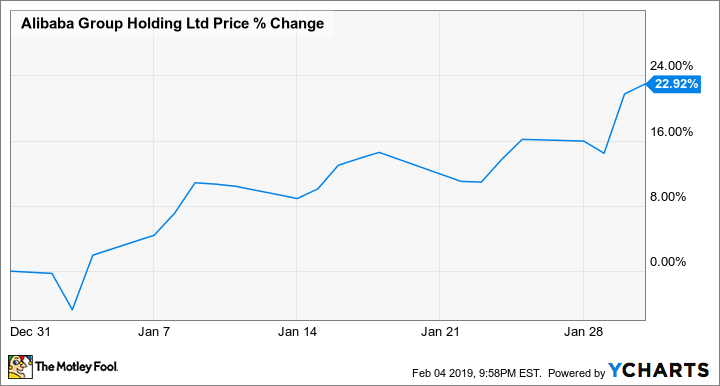What happened
Shares of Alibaba (BABA 0.64%) were moving higher last month after the Chinese e-commerce giant gained alongside other Chinese stocks on signs that trade talks between China and the U.S. could yield a desirable compromise and as the tech giant turned in a strong third-quarter earnings report at the end of the month.
According to data from S&P Global Market Intelligence, the stock finished the month up 23%. As you can see from the chart below, the stock increased steadily over the course of the month as Chinese stocks broadly rose, and jumped at the end of the month after its earnings report.
So what
After getting battered last year, Chinese stocks got off to a good start this year as the Shanghai Composite is up 5% year to date. E-commerce stocks like Alibaba, JD.com, and Baozun are doing even better, up around 20% since the start of the year, as they've benefited from the shift in investor sentiment. Despite data that showed Chinese economic growth slowing, investors were encouraged by apparent progress in trade negotiations between China and the U.S., though no deal has yet been reached.

Image source: Alibaba.
Alibaba confirmed that upbeat assessment with strong third-quarter results. The e-commerce marketplace said revenue was up 41% to $17.1 billion. Though that was slightly below estimates, analysts were pleasantly surprised by the bottom-line figure, as adjusted earnings per share rose 15% to $1.77, ahead of expectations at $1.67.
Its cloud-computing segment posted 84% revenue growth, while its innovation initiatives showed off 73% revenue growth, a sign that the company is replacing slowing growth in its core e-commerce business.
CEO Daniel Zhang said, "Alibaba had another strong quarter. Our resilient operating and financial performance is a direct reflection of our persistent focus on better serving our growing base of nearly 700 million consumers across retail, digital entertainment and local consumer services."
Check out the latest Alibaba earnings call transcript.
Now what
Chinese stocks like Alibaba continue to look cheap, as investors seem to be discounting them for fear over the trade war or a further slowdown in the economy. If an American company was putting up the kind of growth that Alibaba is, not to mention its competitive advantages, it would almost certainly trade at a higher P/E ratio than the 32 that Alibaba's currently valued at.
Alibaba gave no update on its guidance, after spooking investors in the previous quarter when it cut its revenue forecast. The recent round of results should encourage investors, but the macroeconomic environment may ultimately determine the stock's fate over 2019.






